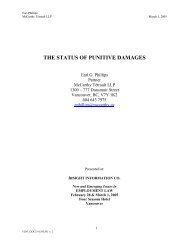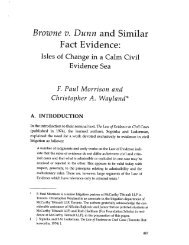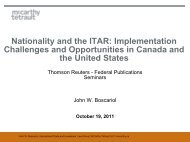The Doctrine of Public Policy in Canadian Contract Law
The Doctrine of Public Policy in Canadian Contract Law
The Doctrine of Public Policy in Canadian Contract Law
You also want an ePaper? Increase the reach of your titles
YUMPU automatically turns print PDFs into web optimized ePapers that Google loves.
42 / Annual Review <strong>of</strong> Civil Litigation<br />
contracts <strong>in</strong>jurious to the state s<strong>in</strong>ce at least 1799.22" Pla<strong>in</strong>ly, therefore, all <strong>of</strong><br />
these categories, each <strong>of</strong> which is still alive today, are <strong>in</strong>extricably bound to the<br />
very idea <strong>of</strong> public policy. To acknowledge this is not to side with the positivist<br />
and claim that the various heads are immutable, but it is to note that the historical<br />
limitation <strong>of</strong> the doctr<strong>in</strong>e to these specific categories is quite <strong>in</strong>comprehensible<br />
when witnessed from with<strong>in</strong> the arbitrary model <strong>of</strong> public policy native to the<br />
consensus and <strong>in</strong>terstitial legislator theories canvassed above.<br />
It is <strong>in</strong>structive <strong>in</strong> this respect to return to Waddams, who expla<strong>in</strong>s the<br />
categories on the basis that "this miscellaneous collection amounts to a series<br />
<strong>of</strong> <strong>in</strong>stances <strong>in</strong> which the courts have weighed public policy aga<strong>in</strong>st freedom <strong>of</strong><br />
contract and preferred the former."22' Such a statement is <strong>of</strong> course partly<br />
accurate, for each <strong>of</strong> the categories has <strong>in</strong>deed somehow been taken to reflect a<br />
value more fundamental than the freedom to contract. Yet it is, <strong>in</strong> fact, possible<br />
to conceive <strong>of</strong> many different "fundamental values" such as the protection <strong>of</strong><br />
the environment, the need for education, the advancement <strong>of</strong> science, the promotion<br />
<strong>of</strong> the arts, the desire for affordable food, hous<strong>in</strong>g and medic<strong>in</strong>e, etc.,<br />
that have never been crystallized <strong>in</strong>to a category <strong>of</strong> public policy, and yet which,<br />
accord<strong>in</strong>g to either the social consensus or the <strong>in</strong>terstitial legislator, may be<br />
more important than the freedom to contract — <strong>in</strong>deed, perhaps even more<br />
important than those values which have been elevated <strong>in</strong>to a category. It is<br />
therefore legitimate to question whether there exists some feature <strong>of</strong> each category<br />
that imbues it with a degree <strong>of</strong> common importance.<br />
Perhaps the most compell<strong>in</strong>g explanation <strong>of</strong> this feature <strong>of</strong> the public<br />
policy categories is <strong>of</strong>fered by the New Zealand commentator Sacha Judd.<br />
Accord<strong>in</strong>g to Judd's view:<br />
[slociety is. . founded on the balanc<strong>in</strong>g that takes place at a macro level between.<br />
. . different <strong>in</strong>stitutions, allow<strong>in</strong>g for <strong>in</strong>dividualism at a micro level.. .<br />
<strong>Contract</strong>s that restra<strong>in</strong> future freedom endanger the necessary autonomy <strong>of</strong> <strong>in</strong>dividuals<br />
with<strong>in</strong> the market. <strong>Contract</strong>s to commit a legal wrong represent an affront<br />
to the system <strong>of</strong> legal sanctions, which is vital to the ma<strong>in</strong>tenance <strong>of</strong> a social order<br />
necessary to the enjoyment <strong>of</strong> <strong>in</strong>dividual rights. Similarly, contracts that oust the<br />
jurisdiction <strong>of</strong> the courts are attempt<strong>in</strong>g to circumvent the judicial process. If we<br />
turn to the categories <strong>of</strong> contract that <strong>of</strong>fend public policy, we can see how many<br />
<strong>of</strong> them threaten this ideological base, through represent<strong>in</strong>g direct conflict at a<br />
macro level between the law <strong>of</strong> contract and a compet<strong>in</strong>g social <strong>in</strong>stitution. . <strong>The</strong><br />
only way the legal system has legitimacy with<strong>in</strong> the liberal state is if all <strong>in</strong>dividuals<br />
are subject to the rule <strong>of</strong> law, and therefore parties must be able to turn to the<br />
courts for relief . . <strong>The</strong>se agreements represent the potential to underm<strong>in</strong>e ideas<br />
that form the foundation <strong>of</strong> the social structure <strong>in</strong> the liberal state. Enforcement<br />
<strong>of</strong> such agreements eventually becomes self-defeat<strong>in</strong>g, or potentially destructive<br />
<strong>of</strong> the compet<strong>in</strong>g <strong>in</strong>stitutions. Critical to this theory is understand<strong>in</strong>g the nature<br />
220 <strong>The</strong> Hoop (1799), 1 C. Rob. 196.<br />
221 Waddanis, supra note 4 at 404.
















